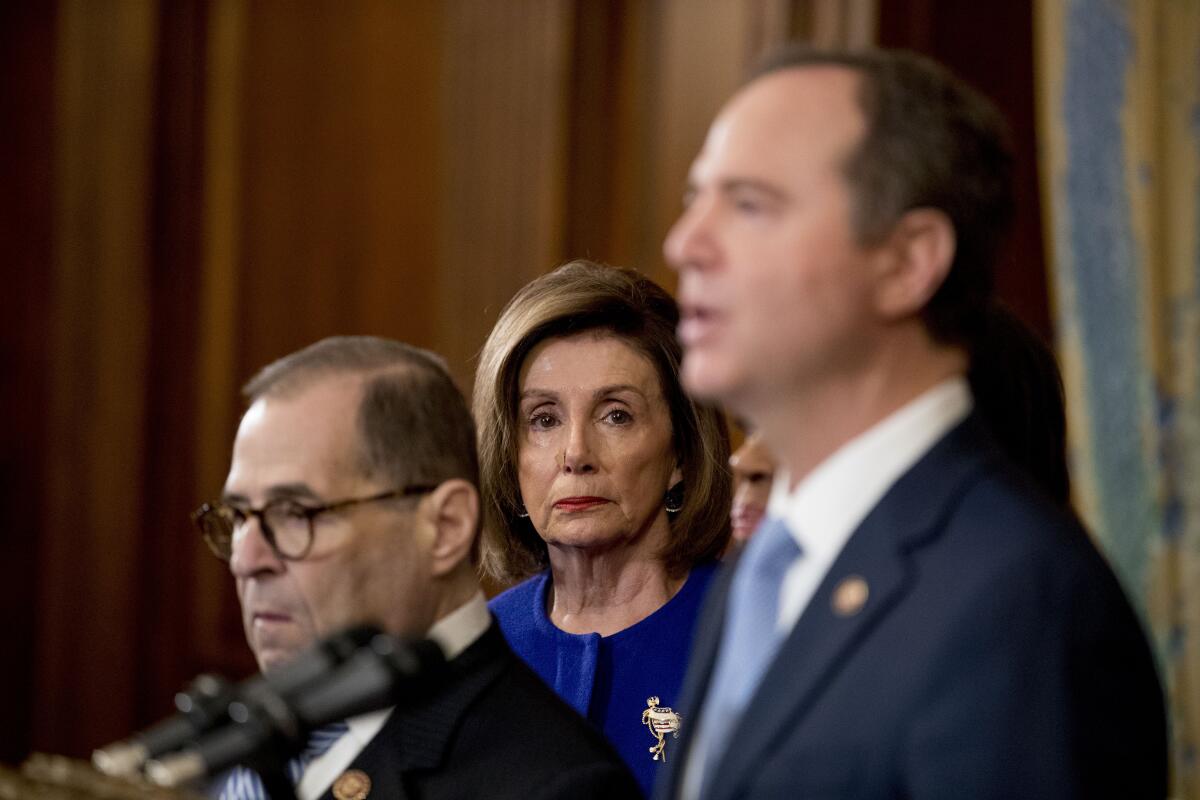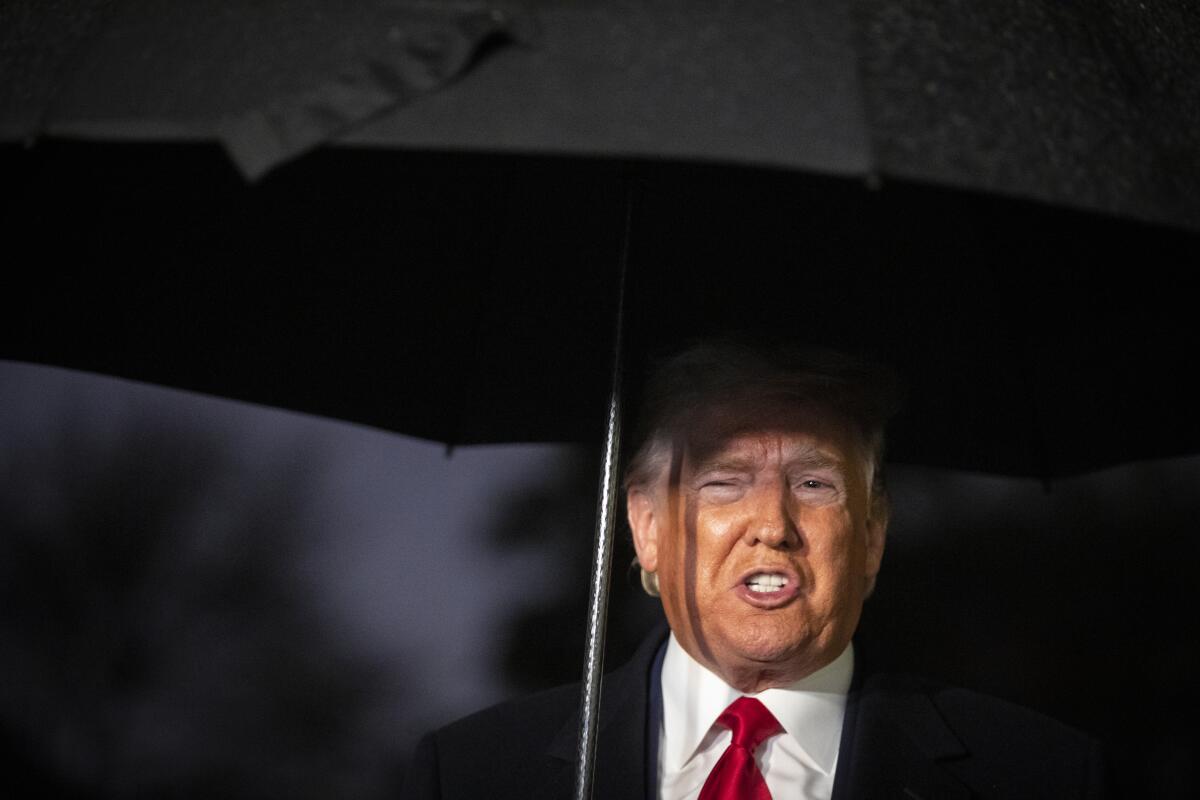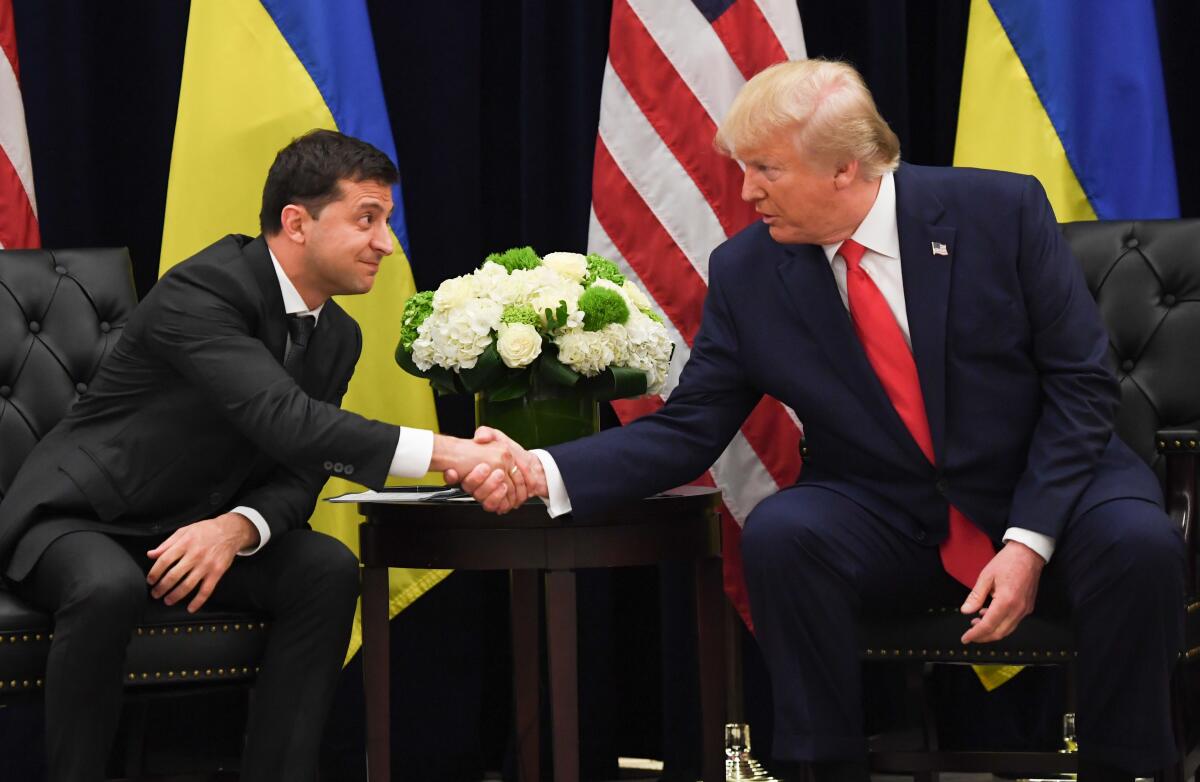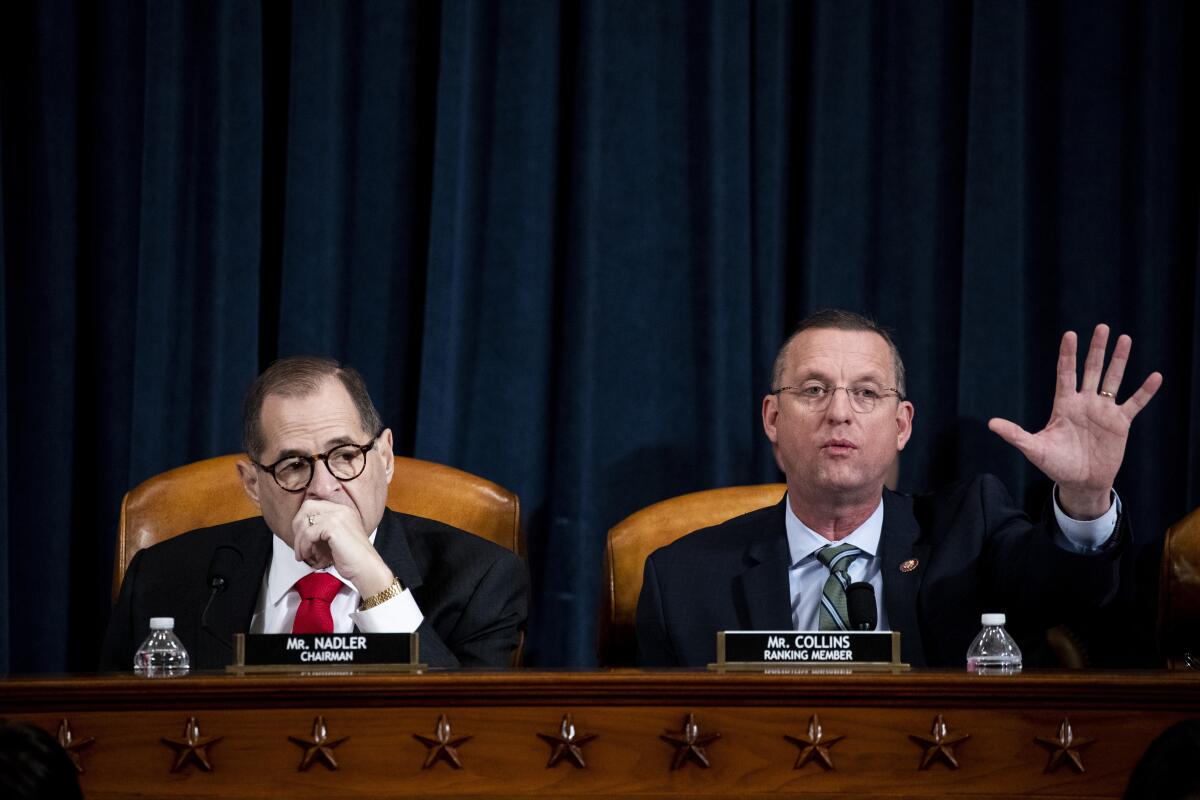Russia is nowhere and everywhere in the impeachment saga

WASHINGTON â When the House Judiciary Committee began its historic session Wednesday night to consider two articles of impeachment against President Trump, one issue was glaringly absent â Russia.
For three years, House Democrats made the Trump campaignâs ties to Russia, and his bitter fight against the special counsel investigation into Moscowâs meddling in the 2016 election, the centerpiece of their argument about why he was unfit to lead the country.
But as the Democratic-controlled House prepares to make Trump the third president in U.S. history to be impeached, Democrats will only consider Trumpâs efforts to press Ukraine to smear his political enemies as he runs for reelection.
What happened to Russia?
âUkraine is even more egregious,â said Rep. Pramila Jayapal (D-Wash.), who originally said lawmakers should consider impeaching Trump for trying to obstruct the special counsel investigation. âWe want to give the Senate the strongest possible case that they can have.â
But the Russia saga has not faded away. Almost every aspect of the Ukraine scandal is tied to Moscowâs interference in U.S. politics, Trumpâs scorched-earth battle for political survival, and his conspicuous solicitousness toward Russian President Vladimir Putin.
âThis isnât about Ukraine,â House Speaker Nancy Pelosi (D-San Francisco) said Saturday. âItâs about Russia.â
She added, âAll roads lead to Putin.â

The scheme at the center of the impeachment proceedings began as an attempt to defend the president against special counsel Robert S. Mueller III, who was investigating Trumpâs inner circle.
Rudolph W. Giuliani, the presidentâs personal lawyer, was exploring ways to undermine the inquiry by suggesting a counter-narrative, arguing that Democrats had secretly conspired in 2016 with a foreign power â in this case, Ukraine.
The scope of Giulianiâs freewheeling advocacy eventually expanded to include allegations that Joe Biden, the former vice president, improperly pressured Ukraine to fire a top prosecutor to protect his son, Hunter Biden, who served on the board of a Ukrainian gas company that faced legal problems.
No evidence has emerged to support the allegations against Biden, but they became politically useful to Trump as Biden became a leading candidate for next yearâs Democratic presidential nomination.
Giuliani was assisted by Igor Fruman and Lev Parnas, two businessmen who were recently indicted on charges of violating campaign finance laws. Both have pleaded not guilty. On Wednesday, prosecutors urged a judge to revoke Parnasâ bail, calling him a flight risk who concealed a $1-million payment from a Russian bank account that he received in September.
Conspiracy theories about improper connections between Democrats and Ukraine dovetailed with Russiaâs efforts to muddy the waters about its clandestine effort to boost Trumpâs chances in 2016, an intelligence operation that included spreading disinformation on social media and releasing hacked Democratic Party emails.
Sometimes Moscow left clues falsely pointing to Ukraine. On March 19, 2016, John Podesta, Hillary Clintonâs campaign chairman, received a fraudulent email suggesting his account had been improperly accessed in Ukraine.
When Podesta clicked the link to change his password, Russian military intelligence operatives were able to steal tens of thousands of his emails, Mueller found.
Paul Manafort, Trumpâs former campaign chairman, also downplayed Moscowâs role. Manafort was convicted last year of tax evasion and bank fraud stemming from his earlier work for a pro-Russia political party in Ukraine.
His deputy, Richard Gates, told federal agents in April 2018 that Manafort suggested âthe hack was likely carried out by the Ukrainians, not the Russians.â
According to Gates, the idea was also pushed by Konstantin Kilimnik, a business associate of Manafort whom U.S. officials have accused of having ties to Russian intelligence.
Some blend of these accusations eventually bubbled up to Trump himself.
The president told U.S. diplomats in May that Ukraine was a âcorrupt country,â full of âterrible peopleâ who âtried to take me down,â Kurt Volker, the former special envoy to Ukraine, testified to the House Intelligence Committee during its impeachment investigation.

When Trump spoke with Ukrainian President Volodymyr Zelensky in the July 25 phone call thatâs at the heart of the impeachment proceedings, Trump asked for investigations into the Bidens as well as Kyivâs alleged role in the 2016 election.
âOur country has been through a lot and Ukraine knows a lot about it,â he said, according to a White House memo summarizing the call. âI would like you to find out what happened with this whole situation with Ukraine.â
Not only was Trump shifting blame away from Russia, but Moscow also stood to benefit in another way.
While Trump was pushing Zelensky to investigate his rivals, he blocked delivery of $391 million in security aid that Ukraineâs military desperately needed for its war with Russia, now in its fifth year. Trump also refused to agree to a White House meeting with Zelensky, which still hasnât been provided.
The outcome has cheered Putin, who has faced stiff sanctions for Russiaâs invasion of Ukraine in 2014 and seizure of Crimea, and its interference in the 2016 race.
âThank God no one is accusing us of interfering in the U.S. elections,â Putin said last month. âNow theyâre accusing Ukraine. Well, they should figure it out among themselves.â
Rep. Jerrold Nadler (D-N.Y.), the chairman of the House Judiciary Committee, nodded toward the dynamic with Moscow when opening Wednesdayâs hearing.
âWe cannot rely on an election to solve our problems when the president threatens the very integrity of that election,â he said. âNor can we sit on our hands while the president undermines our national security â and while he allows his personal interests and the interests of our adversary Russia to advance.â
But Democrats have ultimately decided that building an impeachment case around Russia is not the right approach.
Although Mueller successfully prosecuted Trumpâs national security advisor, former campaign chairman and others, he did not establish a conspiracy between the presidentâs campaign and the Kremlin.
And even though Mueller documented how Trump tried to block or limit the investigation, many of those efforts failed.
For example, the president asked his former campaign manager, Corey Lewandowski, to tell Jeff Sessions, then the attorney general, to limit the Russia investigation, and he directed his White House counsel, Don McGahn, to fire Mueller. Neither order was carried out.
Muellerâs shaky congressional testimony in July, four months after he filed his voluminous report, also did little to embolden Democrats who were eager to launch impeachment at the time.

After Trumpâs efforts to pressure Ukraine were revealed in September after an intelligence agency employee filed a whistleblower complaint, Pelosi pushed for a streamlined impeachment case.
Though some saw the inquiry as a second chance at charging Trump over Russia, ultimately Pelosi knocked back efforts to include Trumpâs fight against the Russia investigation as a possible third article of impeachment for obstruction of justice.
âThe die is cast,â Rep. Gerald E. Connolly (D-Va.) said. âMy sense is the marching orders have been given, and the Judiciary Committee will respond accordingly.â
The Ukraine scandal also offered Democrats a more cohesive narrative involving wrongdoing while Trump was serving as president.
âDuring Watergate, the famous phrase from Sen. Howard Baker was asked, what did the president know and when did he know it?â said Rep. Eric Swalwell (D-Dublin) during a recent hearing. âThereâs a reason that no one here has repeated those questions during these hearings. We know what the president did, and we know when he knew it.â
Rep. Adam B. Schiff (D-Burbank), the House Intelligence Committee chairman, said Democrats were not giving up on the Russia investigation, noting that they were still pursuing litigation to compel testimony from McGahn, a key witness for Mueller.
But Schiff said the Ukraine scandal was more urgent because of the potential impact on next yearâs election.
âWe wanted to go with the articles that were the most time-imperative,â he said. âThe articles that spoke to the presidentâs continuing effort to interfere in the next election. The articles that really couldnât wait.â
Even though the impeachment proceedings remain focused on Ukraine, questions about Trumpâs approach to Russia will almost certainly persist.
While the president has yet to grant Zelensky the White House meeting heâs craved, Trump welcomed Russian Foreign Minister Sergei Lavrov to the Oval Office on Tuesday. He tweeted a photo of himself smiling from behind the Resolute Desk, Lavrov standing to his right.
Administration officials insisted that Trump warned Russia to stay out of U.S. politics, but Lavrov said the topic was not discussed, and he continued to deny Moscowâs involvement.
âWe hope that the turbulence that appeared out of thin air will die down, just like in 1950s McCarthyism came to naught, and thereâll be an opportunity to go back to a more constructive cooperation,â Lavrov said.
Times staff writers Jennifer Haberkorn and Tracy Wilkinson contributed to this report.
More to Read
Get the L.A. Times Politics newsletter
Deeply reported insights into legislation, politics and policy from Sacramento, Washington and beyond. In your inbox three times per week.
You may occasionally receive promotional content from the Los Angeles Times.












